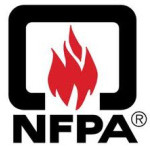- Industry: Fire safety
- Number of terms: 98780
- Number of blossaries: 0
- Company Profile:
Established in 1896, NFPA's mission is to reduce the worldwide burden of fire and other hazards on the quality of life by providing and advocating consensus codes and standards, research, training, and education.
The conductors from the service point to the service disconnecting means.
Industry:Fire safety
The conductors from the park service equipment to the recreational vehicle site supply equipment.
Industry:Fire safety
The conductors and equipment for delivering electric energy from the serving utility to the wiring system of the premises served.
Industry:Fire safety
The conductor used to connect the noncurrent-carrying metal parts of equipment, raceways, and other enclosures to the system grounded conductor, the grounding electrode conductor, or both, at the service equipment or at the source of a separately derived system.
Industry:Fire safety
The conductor used to connect the noncurrent-carrying metal parts of equipment, raceways, and other enclosures to the system grounded conductor, the grounding electrode conductor, or both, at the service equipment or at the source of a separately derived system.
Industry:Fire safety
The conductor connected to the neutral point of a system that is intended to carry current under normal conditions.
Industry:Fire safety
The conductor or radio channel and associated equipment that are used to perform a specific function in connection with an alarm system.
Industry:Fire safety
The conductive path installed to connect normally non-current-carrying metal parts of equipment together and to the system grounded conductor or to the grounding electrode conductor, or both.
Industry:Fire safety
The conductive path created to reduce or dissipate the electrostatic charge where it builds up as a result of equipment operation or induced from an electrostatically charged person or material coming in contact with the equipment. Also referred to as staticgrounding.
Industry:Fire safety
The condition where unburned fuel (pyrolysate) from the originating fire has accumulated in the ceiling layer to a sufficient concentration (i.e., at or above the lower flammable limit) that it ignites and burns; can occur without ignition of, or prior to, the ignition of other fuels separate from the origin.
Industry:Fire safety
